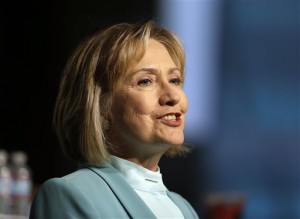Hillary Clinton calls for election reform

Former Secretary of State Hillary Clinton speaks to the American Bar Association Annual Meeting Monday, Aug. 12, 2013, in San Francisco. (AP Photo/Eric Risberg)
SAN FRANCISCO — Potential 2016 presidential candidate Hillary Clinton kicked off a series of speeches on Monday with a call to combat what she called an “assault on voting rights.”
The former U.S. Secretary of State spent most of her 45-minute talk to about 1,000 members of the American Bar Association assailing a recent U.S. Supreme Court ruling striking down a significant part of the Voting Rights Act and discussing what she sees as “deep flaws in our electoral system” as it relates to racial discrimination at the polls.
Clinton spoke in San Francisco after receiving the group’s highest award for service to the law. She said her upcoming speeches would look at national security and U.S. global leadership.
Next month, she intends to speak in Philadelphia about the “balance and transparency necessary in our national security policies as we move beyond a decade of wars to face new threats.” Later, Clinton said she would discuss the implication of American’s global leadership and the nation’s moral standing around the world.
First, however, she took on electoral reform and the assault on voting rights that she said threatens to block millions of Americans from fully participating in our democracy and to further erode public trust.
Article continues after this advertisementShe called on lawmakers to pass legislation countering the U.S. Supreme Court ruling that struck down a requirement that 15 states get approval from the U.S. Department of Justice before changing election systems.
Article continues after this advertisementThe decision has been criticized by civil rights groups that contend it could undermine voting rights in upcoming elections, particularly in the South.
Clinton also criticized the ruling in a speech last month in Washington, D.C., to nearly 14,000 members of the Delta Sigma Theta sorority, a black women’s organization celebrating its 100th anniversary.
On Monday, she said some observers have defended the U.S. Supreme Court ruling as a sign that discrimination has ended. She disagreed and said it gave jurisdictions carte blanche to renew discrimination at the polls.
“In the weeks since the ruling we have seen an unseemly rush by previously covered jurisdictions that will make it harder for our fellow Americans to vote,” she said. “Unless we act now, citizens will be disenfranchised and victimized by the law instead of served by it.”
She also said that even before the Supreme Court ruling, the United States faced a sweeping effort across the country to prevent many people from voting, “often under cover of addressing a phantom epidemic of election fraud.”
She said that more than 80 bills were introduced in 31 states this year to restrict elections rights. She conceded that not all proposed bills were racially motivated.
“But anyone who says that racial discrimination is not a problem in American elections must not be paying attention,” she said.